

After years of late nights together, the day to say goodbye to your old mattress has come. Whether they provided you with years of cozy and comfortable nights or rewarded your time together with an endless supply of backaches, it’s time to move on to bigger and better beds.
But choosing the right bed size isn’t for the faint of heart. You’re making a long-term commitment to a mattress that’s the perfect size for your needs.
Beyond personal preference, several factors should be considered before picking a mattress size. You’ll want to consider the size of your bedroom, who you’ll be sharing your bed with, and how much available space you have.
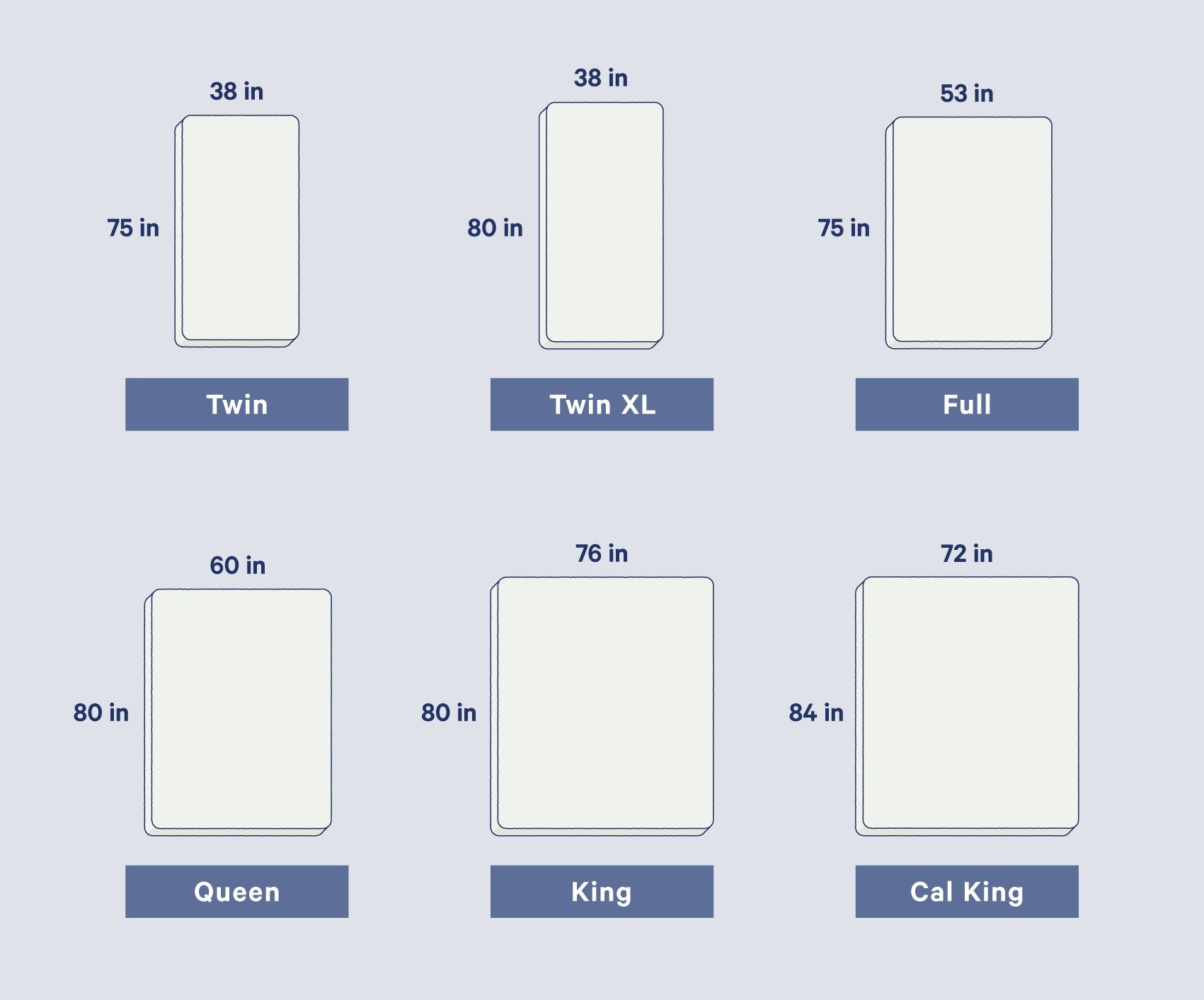

In this mattress size guide, we illustrate the mattress dimensions of all six standard mattress sizes—and some of the lesser-known options—to help you choose the best mattress for your needs.
Shop all mattresses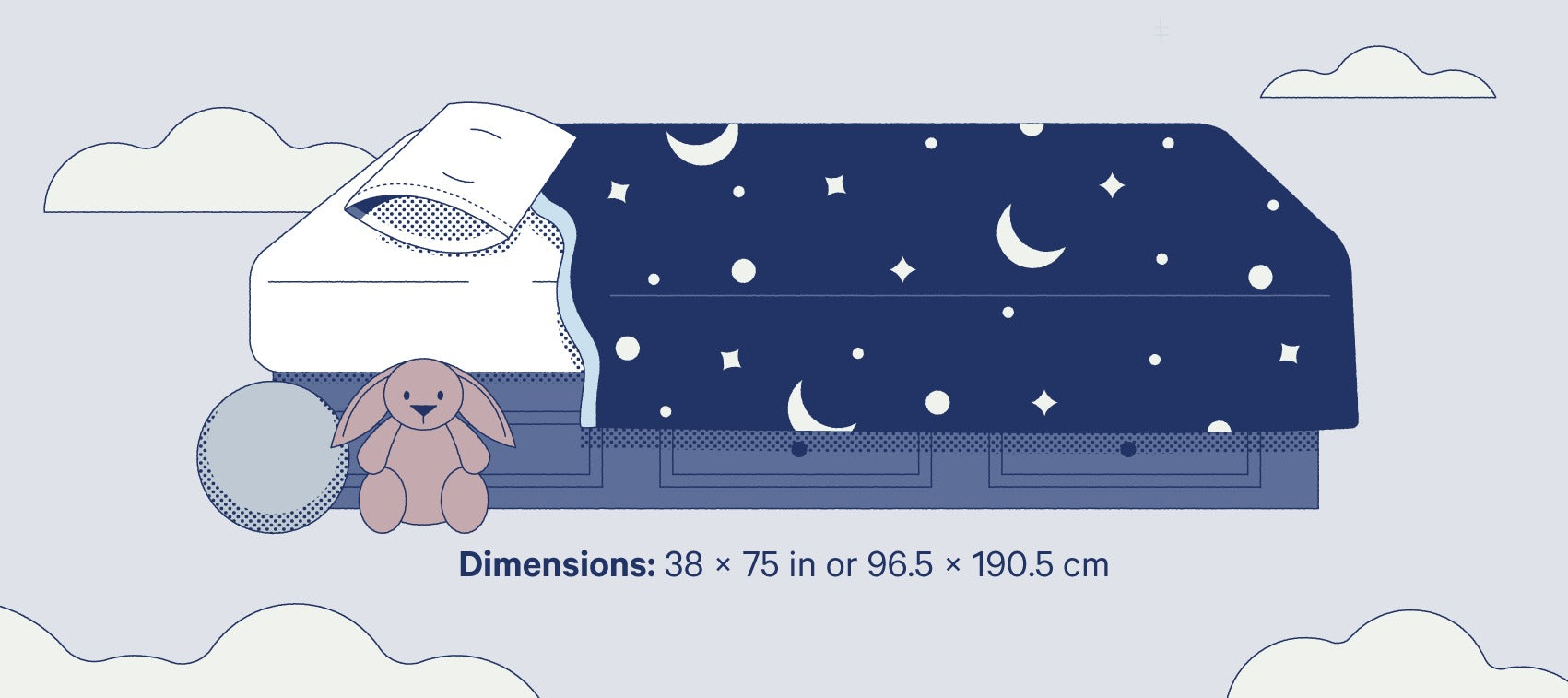

A twin mattress is the smallest traditional bed on the market at 38 inches wide and 75 inches long. Its compact footprint makes it ideal for single sleepers — either children or adults with small spaces like a studio apartment.
Shop Twin MattressesBest for: kids, bunk beds or single sleepers.
Room size: The minimum room size for a twin bed to fit naturally is 7 x 9 feet. But if you’re looking to outfit the room with cozy accessories like a desk and dresser, an 8 x 10 square foot room may be required for the bed to fit more comfortably.
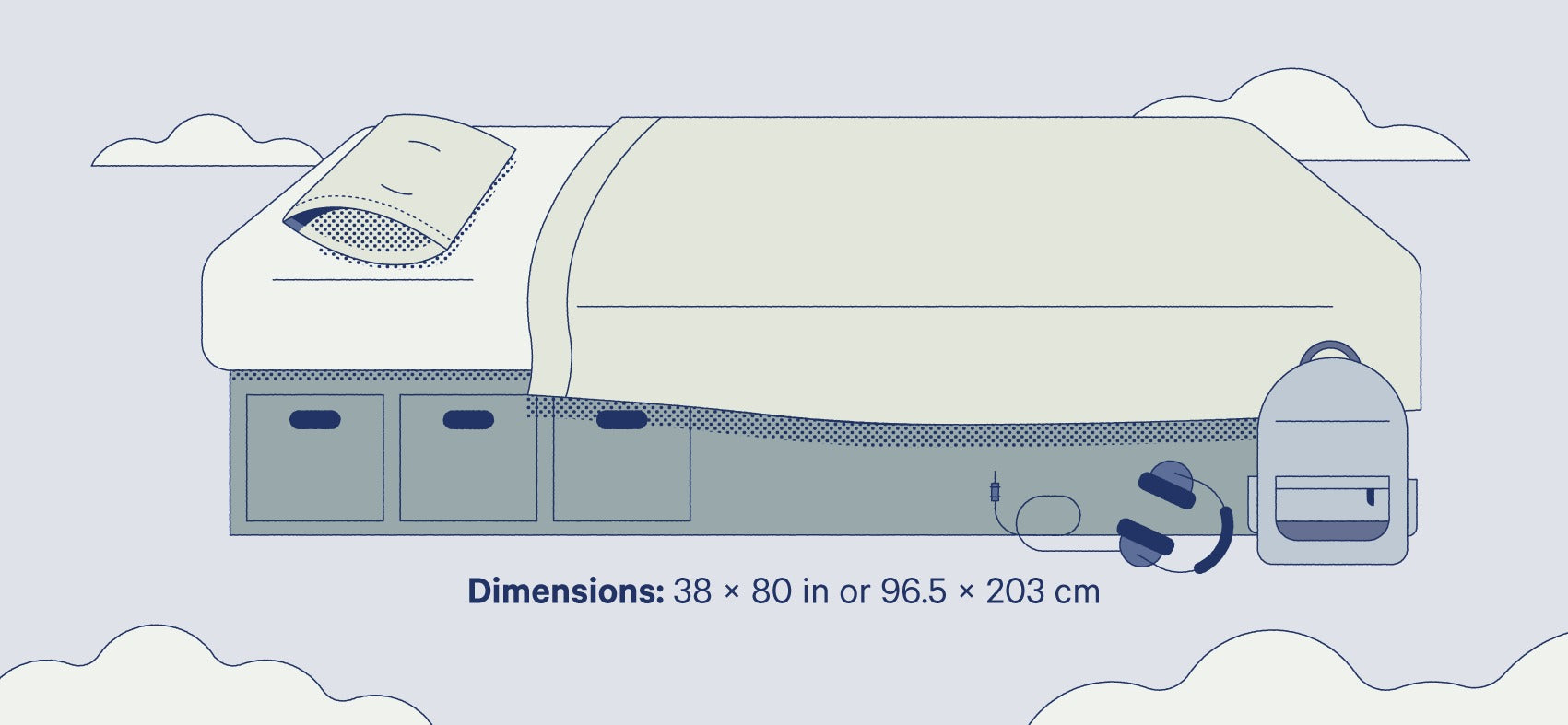

The twin’s slightly longer cousin, the twin XL mattress, is the most popular size for college dorm rooms. It measures five inches longer than a twin, at 38 inches wide and 80 inches long. In addition to students, XL twin beds are a good solution for taller teenagers and individual adults with limited space. These beds can also be put together if you’re choosing a split king adjustable base for full body adjustability!
Shop Twin XL MattressesBest for: taller teenagers, single adults or anyone with limited space.
Room size: The minimum room size for a twin XL mattress to fit naturally is 8 x 10 feet. Twin XL beds can also work well in narrow rooms that are at least 7 feet wide.
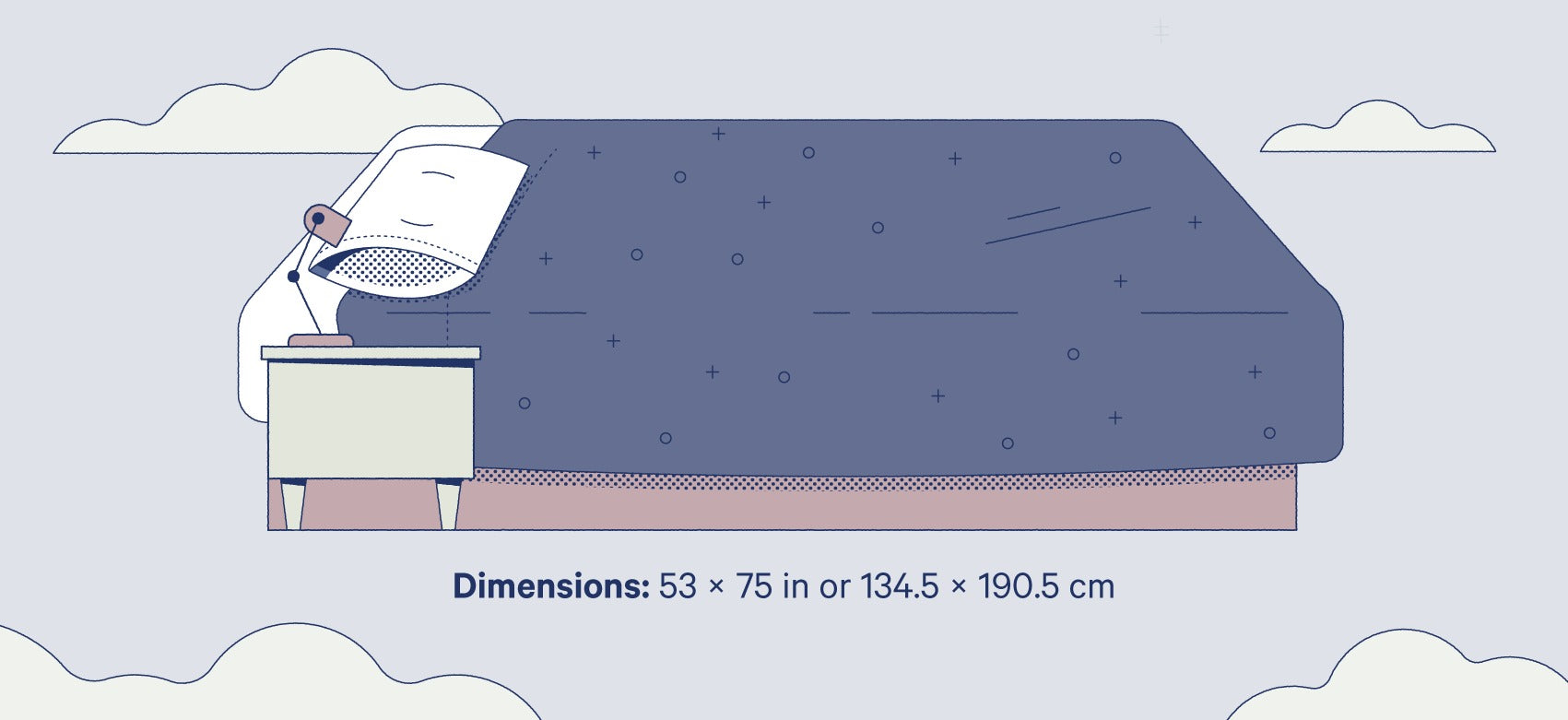

The full mattress is a good starter mattress for young adults or recent grads living on their own for the first time. Sometimes called a double, the full is 16 inches wider than a twin at 53 inches wide and 75 inches long. A full is not recommended for couples who like to share the bed with pets or their children or enjoy sleeping like starfish. However, it is a smart choice for guest rooms or couples who enjoy a solid night of snuggles.
Shop Full MattressesBest for: young adults, couples who like to cuddle or guest rooms.
Room size: The minimum room size for a full bed to fit comfortably is 10 x 11 feet.
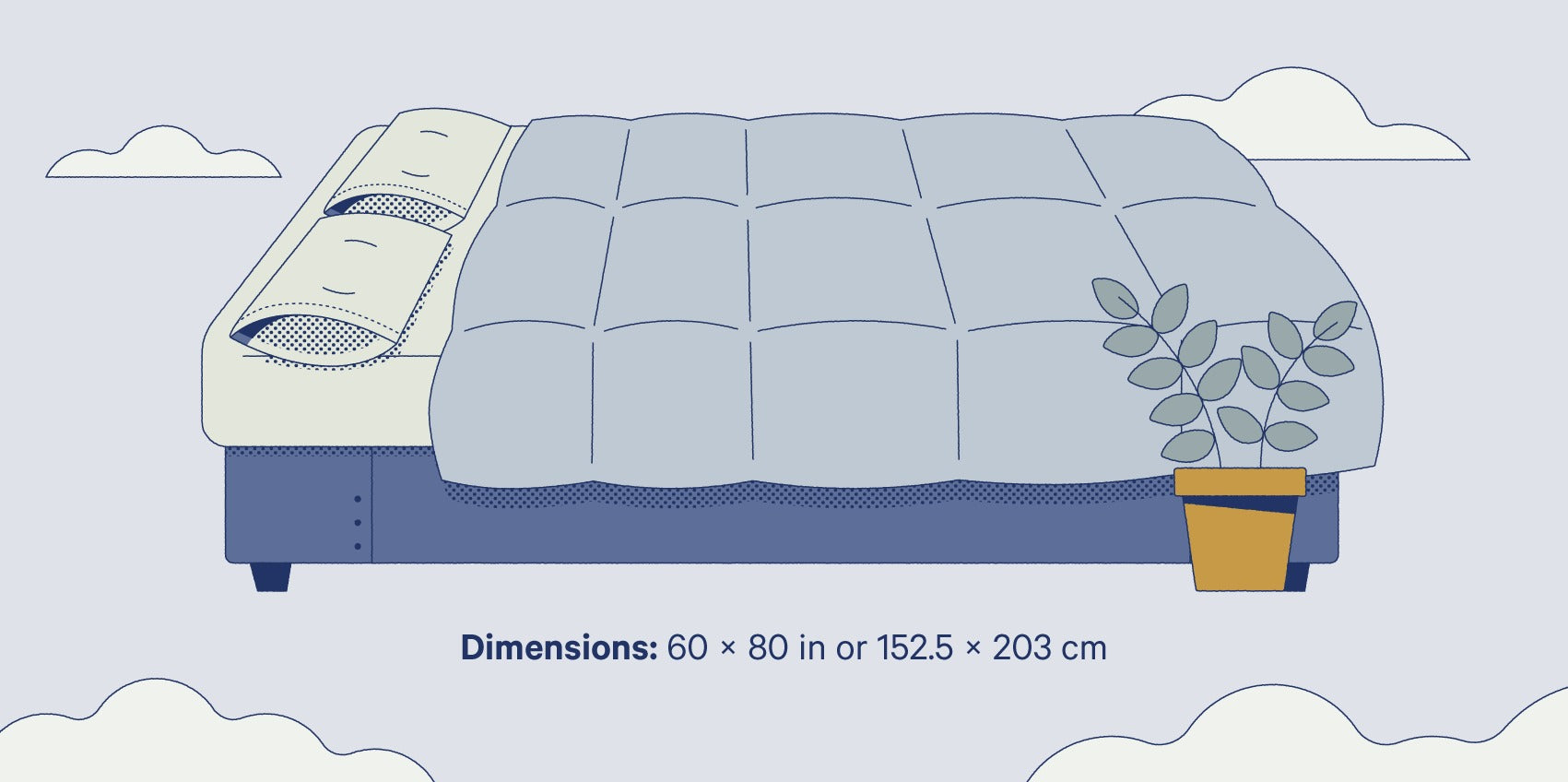

The most popular mattress size on the market is the queen mattress, which is traditionally used in a master bedroom. At 60 inches wide and 80 inches long, the queen mattress size offers plenty of space for couples or individuals who like having extra room to move around in bed. They’re also an excellent choice if you’re the proud owner of a small- or medium-sized furry friend who appreciates the value of a supportive mattress.
Shop Queen MattressesBest for: couples or adults who like to sprawl out.
Room size: The queen mattress fits best in a master bedroom that is at least 10 x 10 feet.
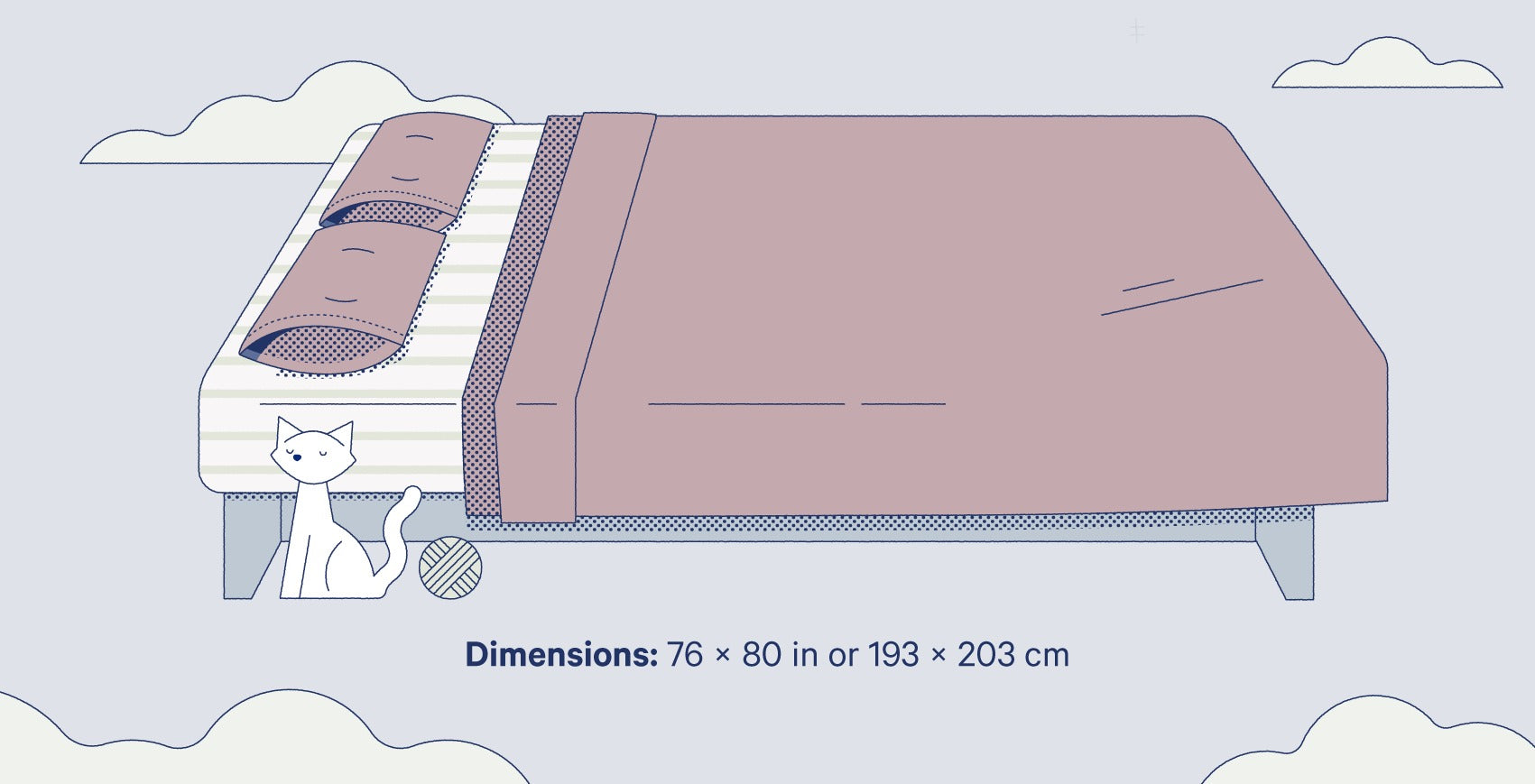

At 76 inches wide and 80 inches long, the king mattress is large enough to accommodate couples who share the bed with their children or a sizable pet (think: a Great Dane). A king bed can be made of two twin beds pushed together, which is referred to as a split king. King beds are large enough that both sleepers can sprawl out with room to spare.
Shop King MattressesBest for: couples who enjoy their sleeping space or share a bed with children.
Room size: A king mattress fits best in a spacious master bedroom, preferably at least 12 x 12 feet.
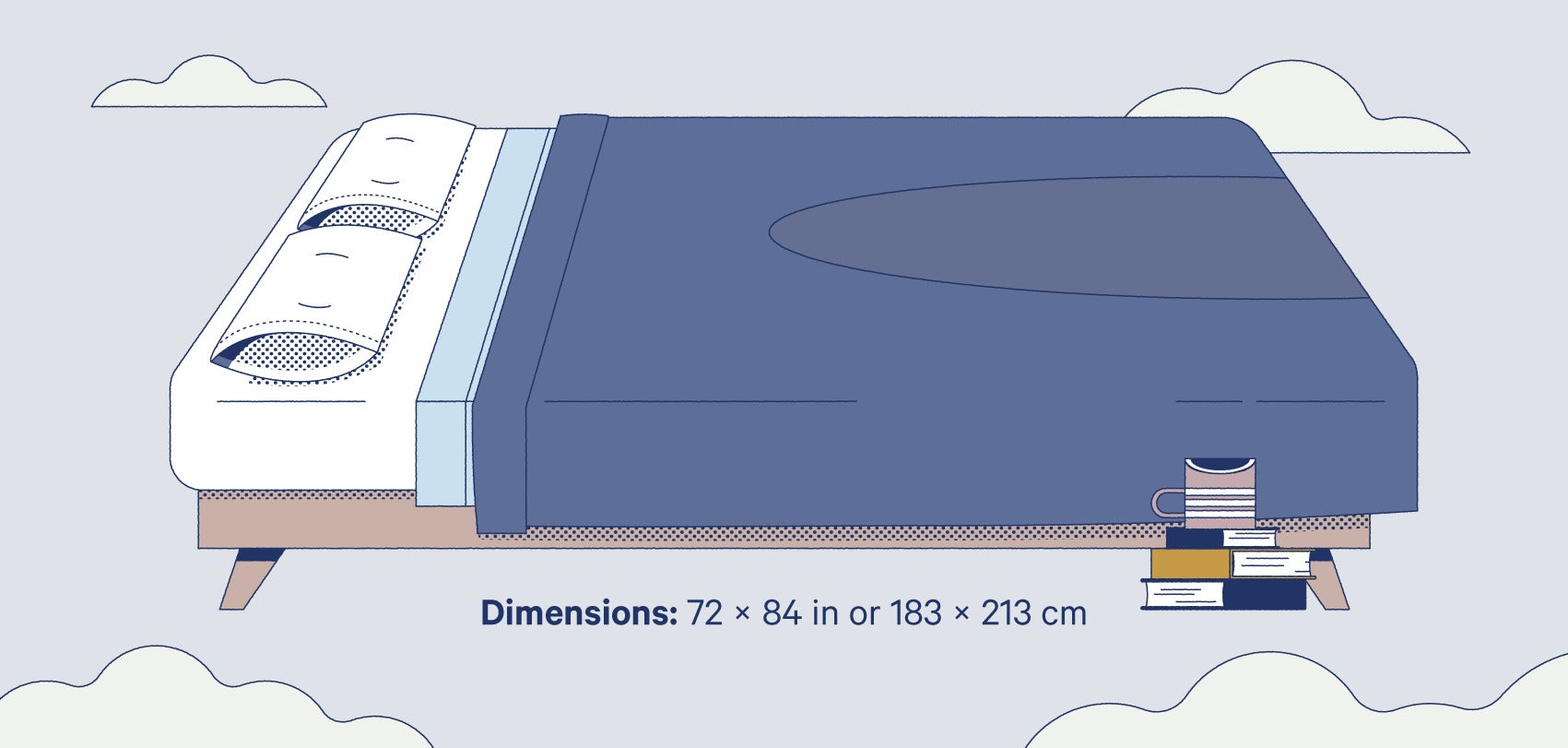

The longest standard mattress on the market, the California king mattress measures a whopping 72 inches wide and 84 inches long. Its generous length makes it ideal for taller individuals, especially people more than six feet tall. Of course, people of average height might also benefit from a California king depending on how many people and pets are sharing the bed.
Shop California King MattressesBest for: Couples with kids or four-legged friends who want a luxurious amount of sleeping space.
Room size: A California king mattress fits best in a large master bedroom of at least 12 x 12 feet.


*Select products ineligible for free shipping or returns where indicated. Additional shipping fees apply to AK and HI.
Good for children or single sleepers in small rooms
Extra length for taller individuals
Suitable for single sleepers wanting more space
Most popular size, ideal for couples
Extra spacious for couples and families
Slightly narrower but longer than King, good for tall sleepers
If it’s time for a new mattress, you may be wondering which size is right for you. There are many factors to consider, like who will be sleeping in the bed, how much space you will need, how much room is in your bedroom, and any specific health or sleep issues you might face.
Buying a new mattress is not a one-size-fits-all situation, so it’s essential to evaluate your individual needs. If you have a history of back pain or sleep problems, you may want a free trial period to help you make sure you’re comfortable with your new mattress.
Here are some other major factors you will want to consider when choosing a mattress.
Will you be sharing the bed with a partner? Do your children or dogs typically sleep with you? These are questions to ask yourself before deciding on mattress size. Typically twin, twin XL, and full mattresses are meant for one person. On the other hand, queen, king, and California king beds are a good bed size for couples and any children or pets that wander into the bed in the middle of the night.
If you are going to sleep with another person, consider how close you like to sleep. If you both enjoy stretching out when sleeping, the extra room afforded by a king or California king size will be appreciated—and help you avoid any accidental thwacks if your partner rolls over in their sleep.
The amount of space available to you should also be considered. A larger mattress will take up more space in your bedroom, as will any other bedroom furniture, so you will need to plan accordingly.
To help you decide if there is ample space for the mattress you’re considering for your room, here is a bed size dimensions chart in square inches and square feet:
You should take your height and width into consideration when choosing a mattress. A typical twin mattress is 75 inches long, while a twin XL is 80 inches long. If an individual is taller than six feet two inches, a twin mattress is probably not for them. Instead, it’s best to go with the XL, full, queen, or king bed, all of which can accommodate someone who is up to 6 feet 7 inches.
Those that are taller than 7 feet should opt for a California king bed. For those who want more space on either side of their body, a full, queen, or king bed will be the most comfortable.
When narrowing down your mattress size choices, consider how much space you’ll need to comfortably move around while you sleep. Do you toss and turn like a cowboy riding a bronco, or do you more closely resemble a hibernating bear who doesn’t move once you close your eyes?
You could be a side sleeper, a back sleeper, a stomach sleeper, or a combination of the three—most people are. If you know you do a lot of sleep-riddled moving and grooving as you sleep, a wider mattress might be a better choice for you.
The amount of money you are willing to spend on a mattress can also help you choose the right size. A king will cost more than a queen size, and a queen more than a full, etc. Buying a mattress that meets both your size needs and your financial needs is key.
Of course, there are other factors that determine the price of a mattress, including:
Materials – The materials that manufacturers use to make their beds play a big role in deciding the final price of a mattress. For example, innerspring and all-foam mattresses are a more cost-effective option if you’re on a budget. In contrast, latex and hybrid beds use more high-end materials and can cost twice as much but are more durable and provide ample comfort and support.
How you buy it – Nowadays, when it comes to shopping, many people prefer to make their purchases online. However, mattresses are often the exception to the rule because it’s helpful to get a real feel for the bed before you commit to purchasing it.
That said, there are also real advantages to shopping online. According to the Sleep Foundation, some brick-and-mortar stores actually mark up the cost of their mattresses by up to 900%. In contrast, online retailers have less overhead costs and can often sell their products at a more affordable rate, saving you some valuable dollars in the process.
Once you’ve found a mattress that checks off all of your must-have boxes, it’s time to treat yourself (and it) to bedding that pairs perfectly with your bedroom’s current aesthetic.
But what exactly does bedding consist of?
Generally speaking, the term bedding includes some of the fundamental accessories for your bed, like:
Sometimes our need for instant gratification gets the best of us and we buy the first duvet and set of sheets we come across. But you can ensure your new sheets are the perfect fit for any mattress by considering these helpful tips and tricks to find the bedding that’s right for you:
What Are Some Less Common Mattress Sizes?
While six traditional mattress sizes may feel like plenty of options to choose from, sometimes you want something a little less traditional.
Perhaps you have very distinct personal preferences. Maybe the size and shape of the room you’re decorating requires something more unique.
Whatever the reason, there are numerous lesser-known mattresses (aka specialty sizes) available. From the “small single” to the gargantuan “Alaskan King,” here are some of the specialty mattress sizes and their bed size dimensions:
Common Mattress Sizing Mistakes
Choosing the right size is about more than “will it fit?”—it’s about daily comfort, clean lines in your space, and a smooth delivery day. Here are the easy-to-miss pitfalls and how to avoid them:
Avoiding these mistakes will help ensure that the mattress size chosen fits well physically, comfortably, and financially for your needs and space.
Finding the perfect mattress isn’t as easy as picking a new button-down for an upcoming date night. Like any relationship, it takes time, patience, and an understanding of what you want to find the one.
Whether you ultimately decide on a full-size, a king-size, or something in between, Casper is here to provide you with a mattress you’ll love just as much in five years as you do the day you bring it home.
You can choose from a variety of high-quality mattresses available in sizes ranging from twin to California King to fit your room no matter its dimensions.
Browse our collection to find your perfect match today.
A single mattress and a twin mattress are one and the same — both have the dimensions of 38 inches by 75 inches. These, along with the twin XL (which is a little longer), are designed to fit one person.
The term “twin” came about because these mattresses were often placed two to a room, either in children’s rooms, hotels, or other rooms that are meant to be shared by more than one person.
Yes, several mattress sizes are smaller than a standard twin, including crib mattresses (28 x 52 inches) for infants, small single mattresses (30 x 75 inches) for children or tight spaces, and youth or junior beds (33 x 66 inches) as a transitional size. Additionally, special smaller sizes like those for RVs can be found.
Although a twin XL is 15 inches narrower than a full, it’s 5 inches longer. Twin XL beds usually can’t comfortably accommodate more than one person, but they are an ideal choice for a single sleeper that’s too tall for a traditional size bed. Twin XL beds are great for small, narrow bedrooms where there’s not a lot of floor space, and are often the bed of choice for college dorm rooms and apartments.
The dimensions for a Casper double size mattress and a full mattress are 53 inches by 75 inches. In this case, both names represent the same kind of mattress. This bed is on the smaller side, but still able to fit two people if needed.
Our Comp. Value prices reflect the price at which we or third parties have offered this item or a comparable item.